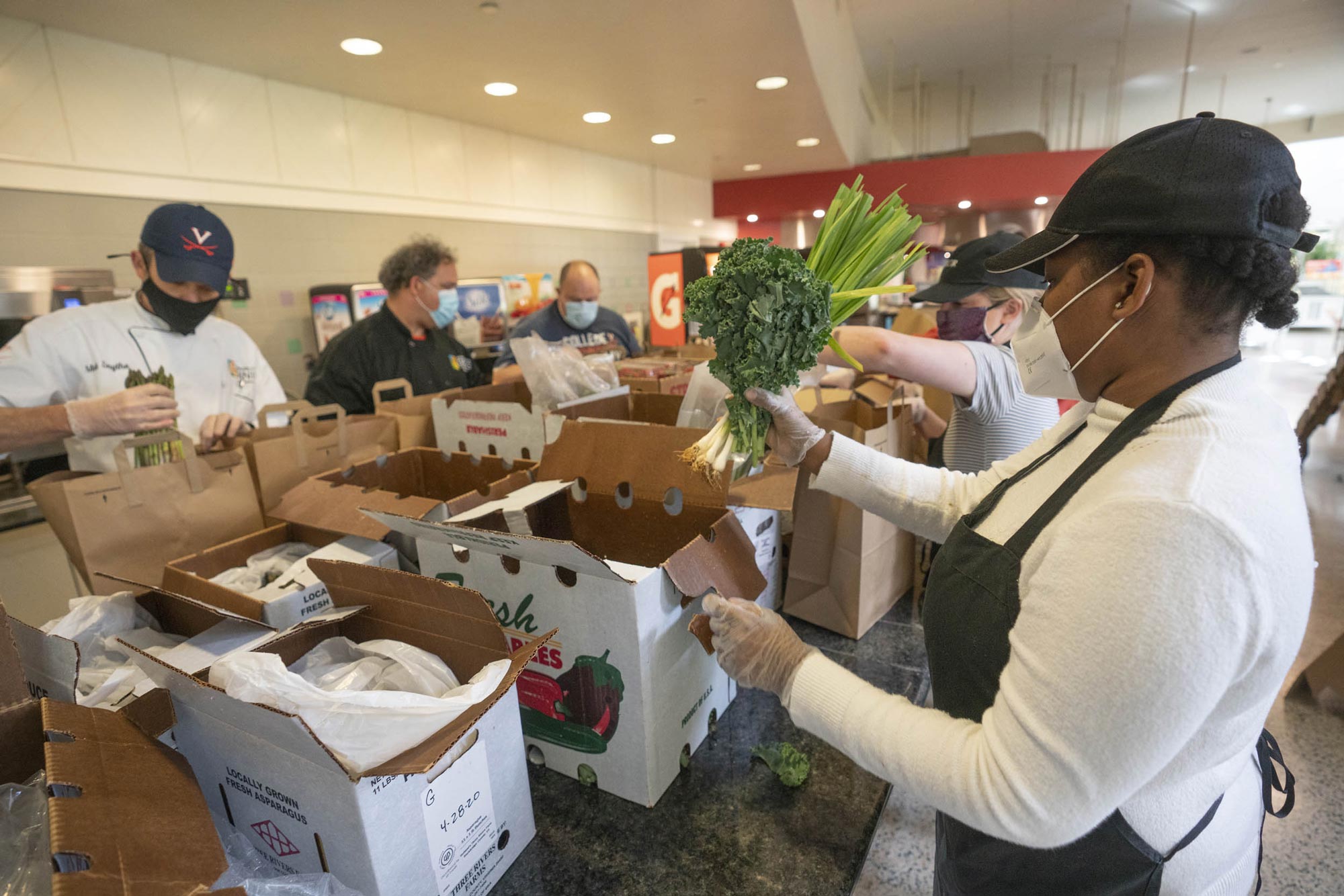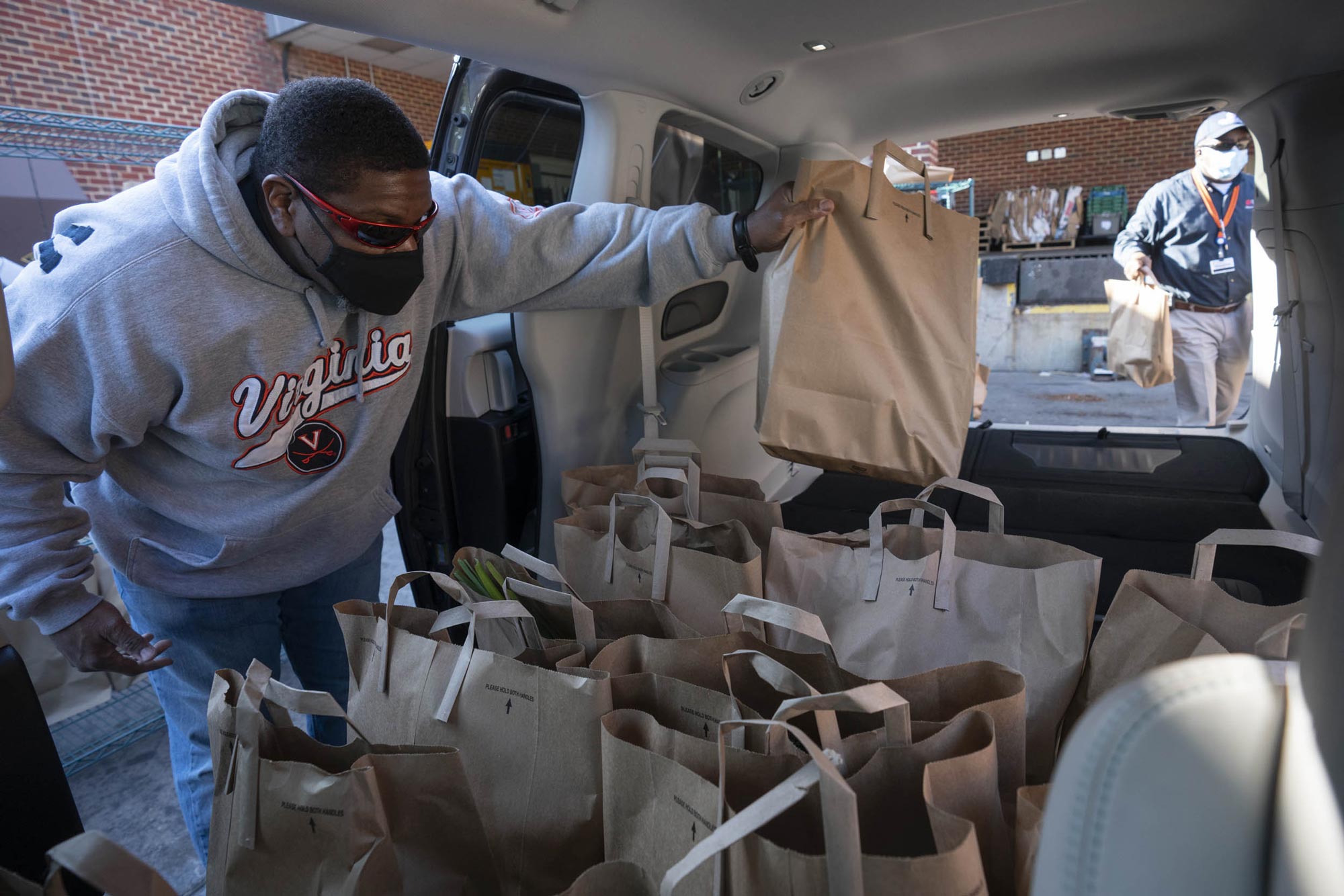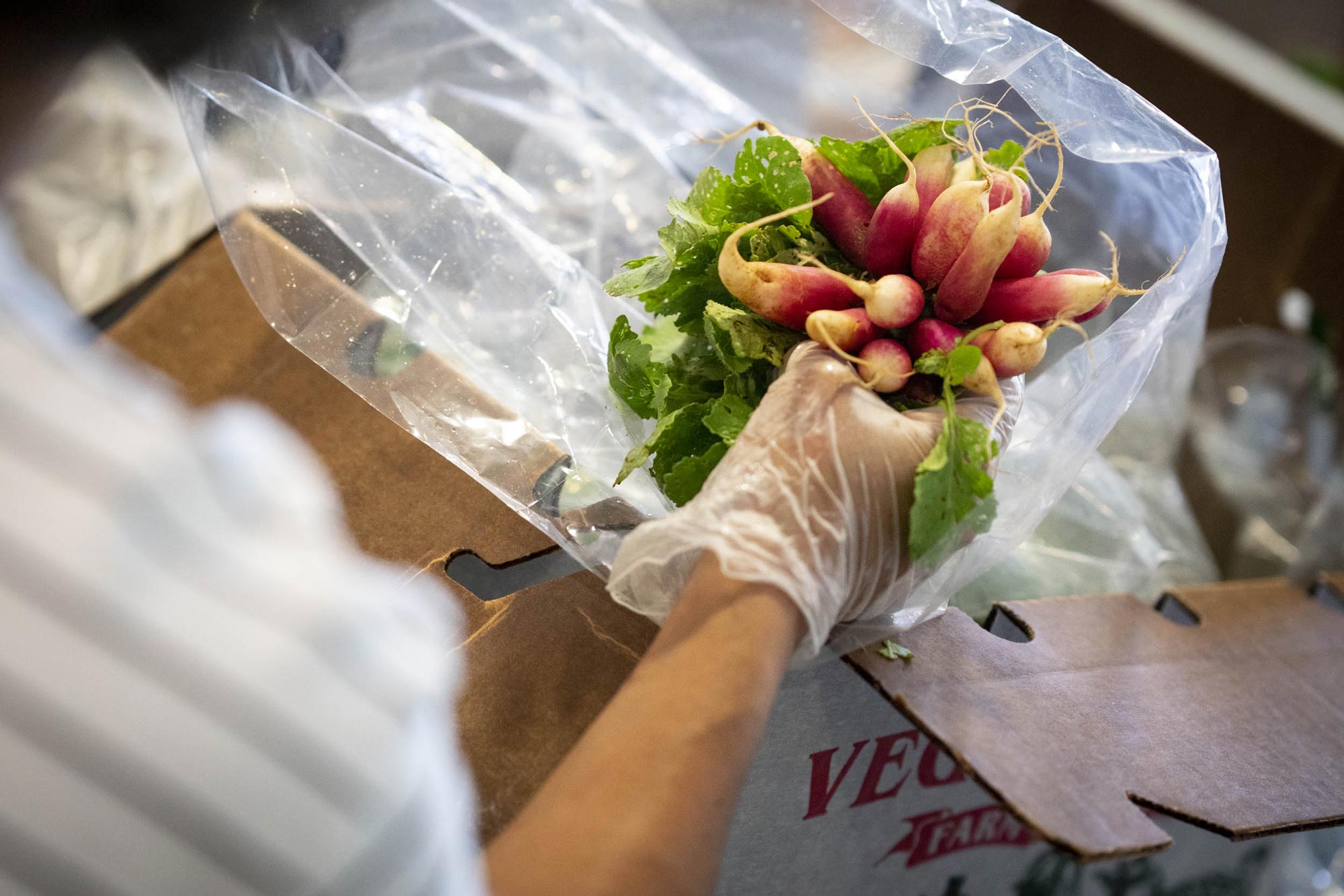Find the latest information on the University’s response to the coronavirus here.
With an assist from the University of Virginia, Local Food Hub is expanding and retooling its “Fresh Farmacy” program to meet evolving community needs for access to fresh, healthy food during the COVID-19 pandemic.
Historically, Fresh Farmacy makes locally sourced fruits and vegetables accessible to low-income health clinic patients who want to make lifestyle changes and have diet-related illnesses, such as high blood pressure and diabetes.
The University and Aramark/UVA Dining are providing space in Observatory Hill Dining Hall for packing bags of fresh food and staffing for both packing and delivery. Aramark employees trained in safe food handling assemble the food bags weekly, which then are held in refrigerated storage until Facilities Management employees deliver the bags to central distribution points throughout the community.
Local Food Hub, created 10 years ago as a connection between local farmers and customers such as UVA Dining, UVA Health and area restaurants, created the Fresh Farmacy program in 2015 as a prescription food program with the Thomas Jefferson Health District, working primarily with low-income health clinics in Charlottesville.

Aramark employees working in Observatory Hill Dining Hall pack food bags for the Local Food Hub.
“We started six years ago with 90 patients, and last year we served 283,” said Laura Brown, the Local Food Hub’s director of community and policy. “This year, pre-COVID-19, we had plans in place to serve the same number.”
Then the virus changed everything. After analyzing the community’s needs, Local Food Hub has adapted its traditional health care provider-referred model and is focusing on getting more fresh food into the hands of those who need it.
“We are seeing concern from our growers, who were overnight without the traditional market and some of their major institutional clients, one of which was UVA Dining,” Brown said. “And with food insecurity a growing problem, we are seeing even more need in the community for fresh produce than there was before.
“By extending the Fresh Farmacy program, we can help address both concerns, but we needed support to make it possible.”
Colette Sheehy, the University’s senior vice president for operations, said she is glad that UVA is able to assist during this time of crisis.
“When Local Food Hub approached us to help them ramp up produce deliveries to vulnerable community members, we saw it as an opportunity to be a good partner and help address a community need,” Sheehy said. “We have space for packing and vehicles and people to deliver the food bags, so Denise Herndon, in our Office of Economic Development, brought our parties together and coordinated the process that launched last week.”
With the additional resources, the Aramark employees pack the bags on Wednesdays and Facilities Management employees distribute them on Thursday and Fridays.
“We are still working with the clinic directors to identify the people in need, but it is not limited to those enrolled in a health program,” said Kristen Suokko, executive director of Local Food Hub. “We are expanding it to as many people as we can, working with others in the community, in addition to the clinic directors, to identify where those pockets of need exist.”
Diana Webb, who works at the Sentara Starr Hill Health Clinic at The Jefferson School, said the program has always been important to the clinic’s patients, but is now even more important with patients asking for additional bags of food for friends.

Once packed, the food bags are loaded into Facilities Management vehicles and transported to distribution points.
“COVID has just highlighted issues that already existed in our community,” Webb said.
The contents of the bags will vary from week to week, depending on what is produced by the roughly 70 partner farms with which the Local Food Hub works. Several farms produce “value-added” products such as salsa, vinegar and honey.
Aramark workers will stuff standard paper grocery sacks with produce and other farm-sourced items, such as eggs and dairy products, sourced by Local Food Hub partner farms. In the first week, the produce shares contained a one-pound clamshell of strawberries, a one-pound bunch of asparagus, one bunch of radishes, one dozen eggs, a bunch of green garlic and a bunch of green curly kale. Also included each week are cooking and food storage tips.
“Three weeks ago, we included flour that was grown and milled in Virginia and we provided a pancake recipe,” Brown said. “This week, they will be getting a block of cheese produced by a woman in Lexington who has 200 milking cows.”
During the first week of the partnership, 250 bags of food were packed at Observatory Hill Dining Hall, and this week 330 are planned, with an eventual goal of 500 bags a week. Suokko said Local Food Hub intends to ramp up the program in close collaboration with the community and as the need evolves along with the pandemic.
The agreement between the University and the Local Food Hub extends through Aug. 1. Local Food Hub is continuing its existing relationship with Harvest Moon Catering and Yellow Cab of Charlottesville to reach more community members.
“[If] UVA opens in the fall, we have other partners on which we can rely to make this happen and there might be a different need for this program at that time,” Brown said. “Right now, we are focusing on access.”
Media Contact
Article Information
May 13, 2020
/content/local-food-hub-expands-its-fresh-farmacy-program-assist-uva

